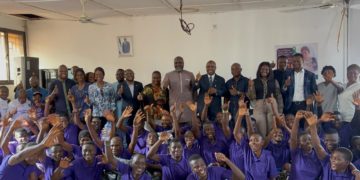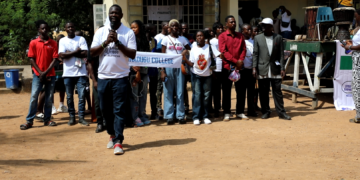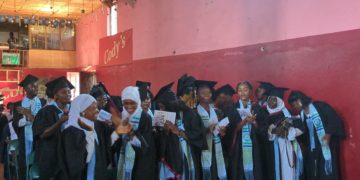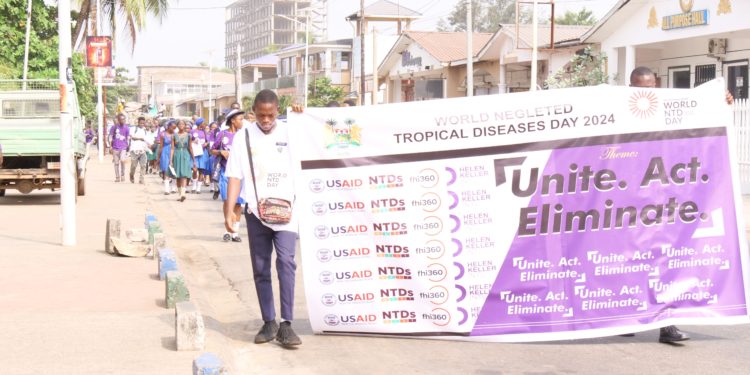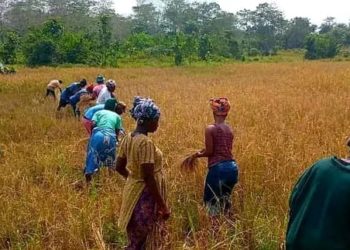By Kemo Cham and Juliana E. P. Kabba
Sierra Leone last week joined the rest of the world to commemorate World Neglected Tropical Diseases Day (WNTD).
The Day declared by the World Health Organization (WHO) is commemorated every January 30th, geared towards raising awareness about the diseases known to be common among people in poor and neglected communities.
There are about 13 illnesses that fall within the NTDs category. In Sierra Leone, the government and its partners target four of them: Lymphatic Filariasis, commonly referred to as Big Foot; Onchocerciasis (Oncho), also known as ‘River Blindness’; schistosomiasis; and soil-transmitted helminthes.
The charity Helen Keler International (HKI) has been leading efforts against NTDs in Sierra Leone, in collaboration with the government and other partners like USAID.
Together with these partners, Hellen Keller organized last week’s commemoration starting with a 3 kilometer distance walk from the Aberdeen Round About to the Lumley Gulf Club, culminating in a high level stakeholders’ event where progress and challenges facing the country’s efforts towards the elimination and control of NTDs were discussed.
Pupils from various schools and beneficiaries of Helen Keller’s programme against the diseases joined campaigners and officials from the Ministry of Health to participate in the event.
This is the fourth time the WNTD Day has been commemorated since it was designated by the 74th World Health Assembly in 2021. And the theme for this year’s event is “Unite, Act, Eliminate,” calling on governments around the world and their partners to unite to act towards the elimination of NTDs. In Sierra Leone, this was translated in Krio to mean: Waka 4 Don Away Wit Big Fut, Blind Yai En Beleh Worrum”.
Data shared by the Health Ministry show that Sierra Leone is on track to eliminate lymphatic filariasis, also commonly called elephantiasis, and put under control soil transmitted helminthes and schistosomiasis by 2030.
But campaigners and government officials warn that to attain the desired goal requires sustaining current efforts.
According to WHO estimates, NTDs affect more than 1 billion people, while the number of people requiring NTD interventions (both preventive and curative) is 1.6 billion. Most of these cases are in tropical countries. Over 200, 000 people die due to one NTD or the other.
The WHO data also show that Africa carries 40 percent of the burden of NTDs, globally. It also shows that 19 countries have eliminated at least one NTD.
But throughout the world, where the diseases are endemic, like in Sierra Leone, challenges posed by local realities are hindering efforts towards elimination and control.
Nonetheless, the last decade has witnessed great achievements in response to the diseases, according to experts.
“Patients are diagnosed now better and faster,” said Dr Louisa Ganda, NTD Technical Adviser at WHO. She noted that one of the reasons for this progress can be attributed to partnerships, stressing the need to strengthen such partnerships.
Dr Ibrahim Kargbo-Lanour, Programme Manager of the National Neglected Tropical Diseases in the Ministry of Health, said NTDs are associated with poverty and lack of proper healthcare, sanitation and hygiene, which need to be addressed as part of efforts to control or eliminate the diseases in the country.
“Celebrating World NTD Day holds great significance. It not only increases awareness among communities, regarding cause and preventive measures, but it also motivates policy makers to prioritize NTDs in central political, government policy, budgeting and strategy,” he said.
Also speaking at the event at the foreground of the Lumley Gulf Club is Victoria Turay, NTDs Programme Manager at Hellen Keller, who pointed out that despite the achievement, the government and its partners must not lose sight of the fact that those who suffer the greatest burden of the diseases are sometimes isolated from social functions. She therefore urged all partners to work towards ensuring effective cross sector coordination and integration to address inequities in terms of free and affordable access to surgeries.



